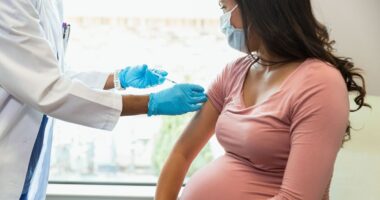Exposure to the sun’s UV rays may have a positive effect on fertility in women aged 30 to 40, say scientists.
The ovaries of women in the ‘late reproductive’ age range were found to secrete more AMH hormone, which is linked to ovarian function, during the summer.
Researchers studied 2,235 Israeli women and found those whose egg reserves were in decline responded positively to sunlight.
Professor Carmit Levy, of Tel Aviv University, hailed the study as ‘pioneering’ but said more research will be needed to confirm the findings.

Researchers studied 2,235 Israeli women and found those whose egg reserves were in decline responded positively to sunlight
She said: ‘This is very encouraging news for women who are trying to have children later in life.
‘We still need to establish how much sunlight a woman needs to get these benefits, but I guess it will be minimal exposure, just enough to start vitamin D production.’
The study comes after a separate study on mice by the same team that found that sun exposure increases metabolism and sexual appetite, enlarges the ovaries and extends the fertility period.
‘Humans are not the same as mice, but we are animals and our hairless nature makes us even more sensitive to solar radiation,’ said Dr Levy.
‘Our research suggests that the female reproductive system is indeed more fertile in the summer, but we still have no information on the mechanism or actual success rates.’
For women aged 20-29, no relationship was found between UV exposure and AMH level.
Researcher Dr Ruth Percik said this may be because younger women have ample egg reserves and don’t need ‘sun signals’ to boost their fertility.
She said: ‘Women at the onset of their reproductive age are less in need of signals from the sun, which affect hormonal pathways that have not yet been sufficiently studied.
‘They are less impacted or dependent on the forces of nature in the context of fertility.
‘In contrast, older ovaries need optimal environmental factors in order to function.
‘In fact, this effect was even more pronounced among women aged 35 and older.
‘Of course, there are caveats: exposure to the sun’s UV radiation should always be done in moderation, and further research is required to determine whether such exposure actually helps fertility, and how much exposure is needed.’
Other studies have shown that excessive exposure to the sun can damage the skin, eyes and immune system.









